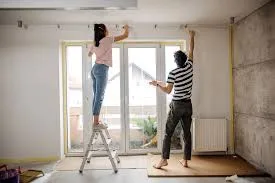Introduction
If you are thinking about carrying out house renovation services London in 2025, you may be wondering how such work will cost. The truth is that the cost of a renovation will depend on various things, such as where the property is located, whether or not it needs any work done to it at all and what materials are used. With higher-than-ever prices, supply network changes, and labour rates rising, you should find out what you can expect from a renovation project for yourself before getting started.
Key Factors Affecting Renovation Costs
Before you get to the soil of the numbers, let’s break down all those things that can affect how much a house renovation London costs you:
1. Property Size and Condition
A small apartment in Central London will be much cheaper to renovate than a large townhouse in the suburbs. Expect to spend considerably more if your property is old and needs such structural work done.
2. Type of Renovation Work
You can upgrade your home in many ways, from simply doing cosmetic updates to undertaking a complete structural renovation. Here is some rough idea of what different kinds of work might cost:
- Cosmetic Upgrades (painting, flooring, minor repairs): £5,000 – £15,000
- Kitchen and Bathroom Renovation: £10,000 – £40,000
- Full Home Renovation: £50,000 – £150,000+
3. Material Costs
In recent years, the price of materials such as timber, tiles and fixtures has been rising. The cost is naturally pushed higher with premium finishes. By choosing materials at the mid-range, you can balance quality and affordability.
4. Labour Charges
Due to high demand, professional tradesmen such as builders, electricians and plumbers have become increasingly expensive. And it’s the greater part of the labour component that you will have to pay for the asked skilled expert, who is working out the design. Your project’s complexity will influence the amount you need to pay for skilled labour.
5. Planning Permissions & Regulations
For large-scale renovation projects, the additional fees that come with planning permission are to be expected. Consult the local government first to avoid unexpected detention or fines.
Estimated Costs for Common Renovation Projects in London
To give you a clearer picture, here’s what you might expect to pay for different types of house renovations in London in 2025:
| Renovation Type | Estimated Cost (London 2025) |
| New Kitchen Installation | £12,000 – £30,000 |
| Bathroom Refurbishment | £8,000 – £25,000 |
| Loft Conversion | £40,000 – £70,000 |
| House Extension | £50,000 – £120,000 |
| Full Home Refurbishment | £60,000 – £150,000+ |
Budgeting Smartly for Your Renovation
To control the hard-earned money and avoid waste, follow these budgeting tips:
- Get Multiple Quotes:
Always try to obtain at least three quotes from different contractors to provide you with better decision-making information on how much money is needed
- Plan for Unexpected Costs:
leave at least 10- 15% of your budget to get rid of any tricky hidden aspects that may arise during work.
- Choose the Right Contractor:
Choose a professional with experience and pricing transparency policies, as they will make sure to provide an accurate answer about what is feasible within the time frame.
Trends Shaping Renovation Costs in 2025
Like all global cities, London’s renovation costs are influenced by trends that are in demand. Here’s the situation for this year:
1. Sustainability & Eco-Friendly Materials
With rising utility bills, city homeowners are buying energy-efficient alternatives. More and more people will be looking for solar panels, insulation upgrades, and even eco-friendly building materials.
2. Smart Home Technology
From smart lighting to high-tech security systems, homeowners today are adding extra technology when they renovate their homes. This adds to the total cost of home decorations but also enhances the overall value.
3. Demand for Open-Plan Living
Many households prefer open-plan designs, because removing them increases the costs of renovating the house structure, thus changes can often increase renovation expenses.
Is Now a Good Time to Renovate?
With house prices in London changing and the landlord chooses to renovate rather than move. During this rising period, turning your house can still be a smart investment, increasing its value and making you feel more at home in the meantime.
If you’re thinking of renovating your home, it is always best to consider the bigger picture. Plan ahead, find quotations, and work with qualified professionals. This way, your renovation won’t just enhance your living experience, will also make your home more appealing to the market in general.

To ensure that you have a perfect renovation and do not waste money on expensive mistakes, it is crucial that you budget your finances well. If you’re searching for reliable experts in House Renovation London, always double-check reliability, reviews, and past projects before making a decision.
Conclusion
Renovating a London home in 2025 will surely require substantial planning and budgeting. With the relentless increases in material costs, labour charges, and demand for eco-friendly remedies, gaining an early commencement is crucial. Whether embarking on minor tweaks or a total rebuilding, recognising estimated pricing enables more strategic scheduling to remain within intended budgets. By engaging highly qualified specialists and maintaining realistic aims, homeowners can strive to accomplish a smooth renovation that not only improves how they live but also raises property values.
Frequently Asked Questions (FAQS)
1. What is the average cost of house renovation in London in 2025?
The average price range for a house renovation in London in 2025 is between £60,000 to £150,000 or more. The final cost depends on factors such as the property size, scope of work, and materials selected. Smaller touch-ups may be £20,000 to £50,000, while major overhauls or extensions could exceed £150,000 substantially.
2. How can I accurately budget for my home renovation?
Getting multiple estimates from contractors is crucial for effective budgeting, as is prioritizing essential repairs. You’ll also want to set aside at least 10-15% more than estimates for unexpected expenses that often arise. Be sure to compare prices on materials and labour to get the best value without cutting quality corners.
3. What are the biggest hidden costs in a house renovation?
Structural repairs, plumbing or electrical upgrades, permission fees, and rising material prices cause unforeseen budget increases. It is crucial to have a sizable contingency to cover any surprises that emerge throughout the project. Proper planning is key to avoiding costly mistakes.

